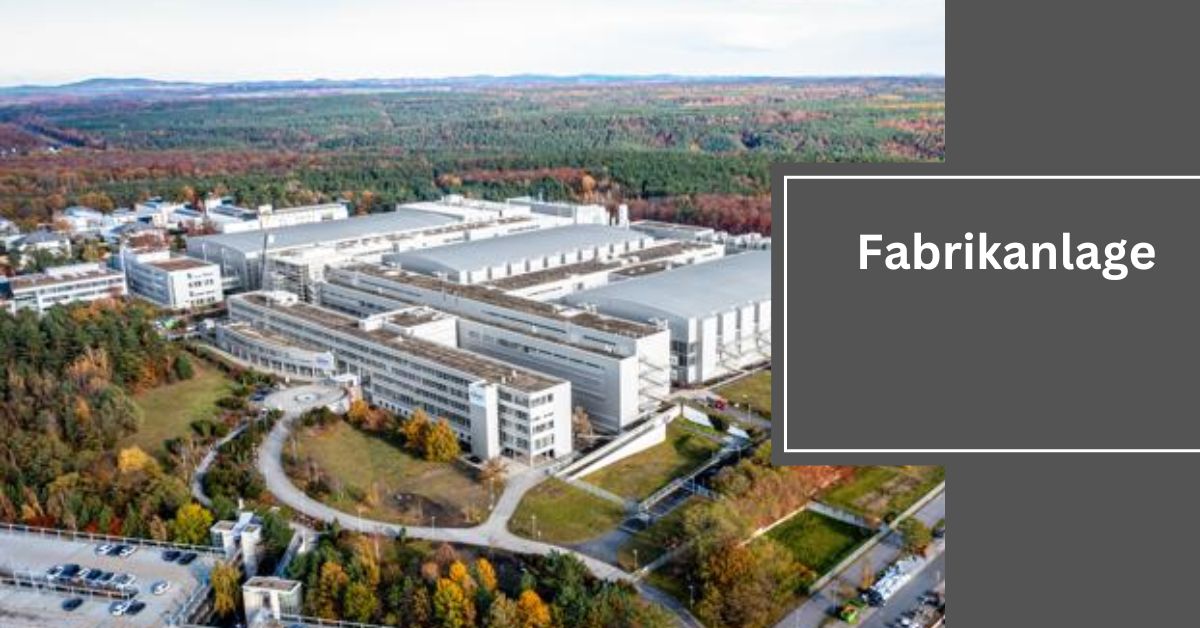Fabrikanlage – Explore Advanced Solutions!
Implementing a fabrikanlage transformed our manufacturing process, drastically reducing lead times and operational costs. The integration of advanced automation and IoT systems has not only enhanced product quality but also increased overall efficiency.
A fabrikanlage is a modern manufacturing facility that integrates advanced automation, IoT, and optimized workflows to boost efficiency and reduce costs. It enhances product quality through streamlined, interconnected processes.
In this article, we will discuss the concept of a fabrikanlage, exploring traditional manufacturing to highly automated systems. We will cover the different types of fabrikanlage, key components, and benefits, as well as the challenges and solutions for optimizing these advanced manufacturing facilities.
What Is A Fabrikanlage?
A fabrikanlage is a modern manufacturing facility designed to produce goods efficiently and with high quality. It uses advanced technology, such as automated machines and smart systems, to streamline production processes. This helps reduce waste, lower costs, and improve product consistency.

The fabrikanlage is built to be flexible and adaptable, allowing it to quickly respond to changes in demand and incorporate new innovations. Overall, it’s a sophisticated setup that combines infrastructure, machinery, and skilled workers to achieve optimal manufacturing performance.
How Does Automation Benefit A Fabrikanlage?
Automation benefits a fabrikanlage by making production faster and more efficient. Automated machines and robots handle repetitive tasks with precision, reducing the chance of errors and ensuring consistent quality. This helps in cutting down labor costs and increasing productivity.
Additionally, automation allows the fabrikanlage to operate continuously, even during off-hours, maximizing output.
It also enables real-time monitoring and data collection, which helps in quickly identifying and resolving issues, further improving the overall efficiency and performance of the manufacturing process.
Also read: Fintechzoom Pfe Stock – Exclusive Reports On Pfe Stock!
What Are The Main Types Of Fabrikanlage?
- Automated Fabrikanlage: Relies heavily on robotics, machine learning, and IoT for automated production processes.
- Traditional Fabrikanlage: Uses older manufacturing methods with significant manual labor involvement.
- Hybrid Fabrikanlage: Combines automated systems with traditional methods to balance efficiency and adaptability.
Also read: Kingkaex – Your Guide to Secure and Easy Crypto Trading!
What Key Components Make Up A Fabrikanlage?
- Machinery: Central to any fabrikanlage, machinery includes automated robots, conveyor belts, and specialized equipment tailored to specific production needs. These machines ensure precision and efficiency in manufacturing processes.
- Infrastructure: The infrastructure supports the machinery and operational processes, encompassing the physical layout, power supply systems, and transport networks for raw materials and finished goods. It ensures smooth operation and logistical efficiency.
- Workforce: Skilled labor is crucial for operating and maintaining the complex machinery and systems within a fabrikanlage. Training programs are essential to equip workers with the knowledge and skills required for optimal production.
- Safety and Compliance: Adherence to safety regulations is paramount to protect workers and prevent accidents. Compliance with industry standards and regulatory requirements ensures operational continuity and avoids costly fines or shutdowns.
Also read: Margie Washichek – join the conversation!
What Are The Benefits Of A Fabrikanlage?
A fabrikanlage represents a modern and sophisticated approach to manufacturing, encompassing everything from advanced machinery and infrastructure to streamlined workflows and sustainable practices.

By minimizing manual intervention and optimizing processes, fabrikanlagen reduce operational costs and improve scalability. They also promote safety through stringent compliance with industry standards and offer flexibility to adapt quickly to market demands.
Overall, fabrikanlagen play a pivotal role in shaping the future of manufacturing by integrating cutting-edge technology with efficient and environmentally conscious practices.
What Challenges Do Fabrikanlagen Face?
Fabrikanlagen face several challenges despite their advanced technology and efficient operations. One significant challenge is the high initial investment required to set up automated systems and infrastructure.
Technological disruptions also pose a constant challenge, as rapid advancements necessitate frequent upgrades and skilled workforce training.
Moreover, adhering to stringent regulatory constraints, both locally and internationally, demands continuous adjustments in operations and documentation.
Balancing these factors while maintaining competitiveness and sustainability presents ongoing challenges for fabrikanlagen in today’s manufacturing landscape.
Also read: Turrón Carúpano – Order Your Turrón Carúpano Treats Now!
How Does A Fabrikanlage Impact Sustainability?
A fabrikanlage plays a crucial role in promoting sustainability through several key practices. By integrating eco-friendly manufacturing techniques such as renewable energy sources and energy-efficient machinery, fabrikanlagen reduce their environmental footprint.

Additionally, advanced automation and IoT integration optimize energy consumption and reduce emissions, further enhancing sustainability efforts.
Overall, fabrikanlagen strive to balance economic productivity with environmental responsibility, contributing positively to long-term sustainability goals in manufacturing.
What Are The Latest Trends In Fabrikanlage?
The latest trends in fabrikanlage reflect a shift towards smart manufacturing and sustainability. Manufacturers are increasingly adopting advanced technologies such as artificial intelligence (AI), Internet of Things (IoT), and big data analytics to optimize production processes.
These technologies enhance efficiency, improve product quality, and enable predictive maintenance, thereby reducing downtime.Sustainability is also a major focus, with fabrikanlagen integrating eco-friendly practices like renewable energy and waste reduction measures.
This trend towards greener, smarter manufacturing not only boosts operational efficiency but also aligns with global environmental goals, making fabrikanlagen more competitive and sustainable in the long run.
Also read: Listcarlwers – Revolutionizing Car Maintenance!
What Is The Role Of Industry 4.0 In Transforming Fabrikanlagen?
Industry 4.0 plays a crucial role in transforming fabrikanlagen by integrating advanced digital technologies into manufacturing processes. This industrial revolution leverages automation, data exchange, AI, and IoT to create smart factories.

Fabrikanlagen benefit from real-time data analytics that optimize production efficiency, minimize waste, and enhance product quality. These technologies enable predictive maintenance, where machines can preemptively detect issues before they cause disruptions.
Overall, Industry 4.0 enhances the flexibility, scalability, and competitiveness of fabrikanlagen, paving the way for more agile and responsive manufacturing operations in a rapidly evolving global market.
Is A Fabrikanlage Suitable For Small-Scale Manufacturers?
Yes, fabrikanlagen can be suitable for small-scale manufacturers, especially those adopting hybrid models that blend automation with manual labor.
While traditionally associated with large-scale operations due to high initial investment costs, smaller manufacturers can benefit from scaled-down versions of fabrikanlagen.
These setups offer increased production efficiency, reduced operational costs through automation, and improved product consistency.
By integrating technology like robotics and IoT selectively, small-scale manufacturers can maintain flexibility in production while enhancing competitiveness in their respective markets.
Also read: ACM23X – Your Ultimate Guide!
Frequently Asked Questions:
1. How do fabrikanlagen contribute to industrial efficiency?
Fabrikanlagen improves efficiency through advanced automation and streamlined workflows. By integrating robotics and IoT, these facilities minimize production time, reduce errors, and optimize resource utilization.
2. What technologies are essential for modern fabrikanlagen?
Modern fabrikanlagen rely on technologies like AI, IoT, and machine learning to enhance production capabilities. These technologies enable predictive maintenance, real-time monitoring, and data-driven decision-making, crucial for maintaining operational excellence.
3. What role does sustainability play in fabrikanlagen?
Sustainability is pivotal in fabrikanlagen, driving practices such as energy-efficient manufacturing processes, waste reduction, and adoption of renewable resources. These initiatives not only minimize environmental impact but also align with global sustainability goals.
4. How can small manufacturers benefit from fabrikanlagen?
Small-scale manufacturers can leverage hybrid fabrikanlagen models that balance automation with manual labor. This approach allows them to scale operations efficiently, improve product quality, and remain competitive in the market.
Conclusion:
In conclusion, Fabrikanlagen represents the future of manufacturing, combining automation, advanced technology, and sustainable practices to enhance efficiency and reduce environmental impact.
Read more:







